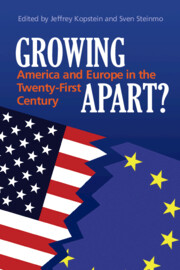Book contents
- Frontmatter
- Contents
- Contributors
- Acknowledgments
- Growing Apart?
- Introduction: Growing Apart? America and Europe in the Twenty-First Century
- 1 The Religious Divide: Why Religion Seems to Be Thriving in the United States and Waning in Europe
- 2 Value Change in Europe and North America: Convergence or Something Else?
- 3 On Different Planets: News Media in the United States and Europe
- 4 One Ring to Bind Them All: American Power and Neoliberal Capitalism
- 5 Spreading the Word: The Diffusion of American Conservatism in Europe and Beyond
- 6 Work, Welfare, and Wanderlust: Immigration and Integration in Europe and North America
- 7 Lost in Translation: The Transatlantic Divide over Diplomacy
- 8 The Atlantic Divide in Historical Perspective: A View from Europe
- Index
Introduction: Growing Apart? America and Europe in the Twenty-First Century
Published online by Cambridge University Press: 19 January 2010
- Frontmatter
- Contents
- Contributors
- Acknowledgments
- Growing Apart?
- Introduction: Growing Apart? America and Europe in the Twenty-First Century
- 1 The Religious Divide: Why Religion Seems to Be Thriving in the United States and Waning in Europe
- 2 Value Change in Europe and North America: Convergence or Something Else?
- 3 On Different Planets: News Media in the United States and Europe
- 4 One Ring to Bind Them All: American Power and Neoliberal Capitalism
- 5 Spreading the Word: The Diffusion of American Conservatism in Europe and Beyond
- 6 Work, Welfare, and Wanderlust: Immigration and Integration in Europe and North America
- 7 Lost in Translation: The Transatlantic Divide over Diplomacy
- 8 The Atlantic Divide in Historical Perspective: A View from Europe
- Index
Summary
As the Cold War drew to a close, most students of international politics had come to believe that the relationship between the United States and Europe was much more than an alliance of interest. The “West” was also a set of ideas: liberal democracy, human rights, and welfare state capitalism were more than just temporary expedients. Taken together, they were the key institutional expressions of the shared values of the West. It is true that the West has never been a unified and homogeneous entity. Still, most of us believed that there was a common project and, whatever our differences, what held us together was far more important than what divided us. Indeed, many of us believed that the countries of the industrialized West were also becoming more alike in their basic values, their models of political economy, and their modes of foreign policy.
Of course, it was never politically correct to assert this, and many of us offered ritual critiques of “the end of history” thesis. Yet it was sometimes difficult to see things otherwise. The louder the protests against the assertion of the final triumph of liberalism, the more inevitable it all seemed. It was hard to deny that Western democratic liberalism won out because this system was simply better than all the alternatives. Consequently, the American–European alliance would dominate the world for as long as any reasonable analyst could foresee. The attacks of September 11, 2001, drove home this consensus.
- Type
- Chapter
- Information
- Growing Apart?America and Europe in the 21st Century, pp. 1 - 23Publisher: Cambridge University PressPrint publication year: 2007
- 1
- Cited by



